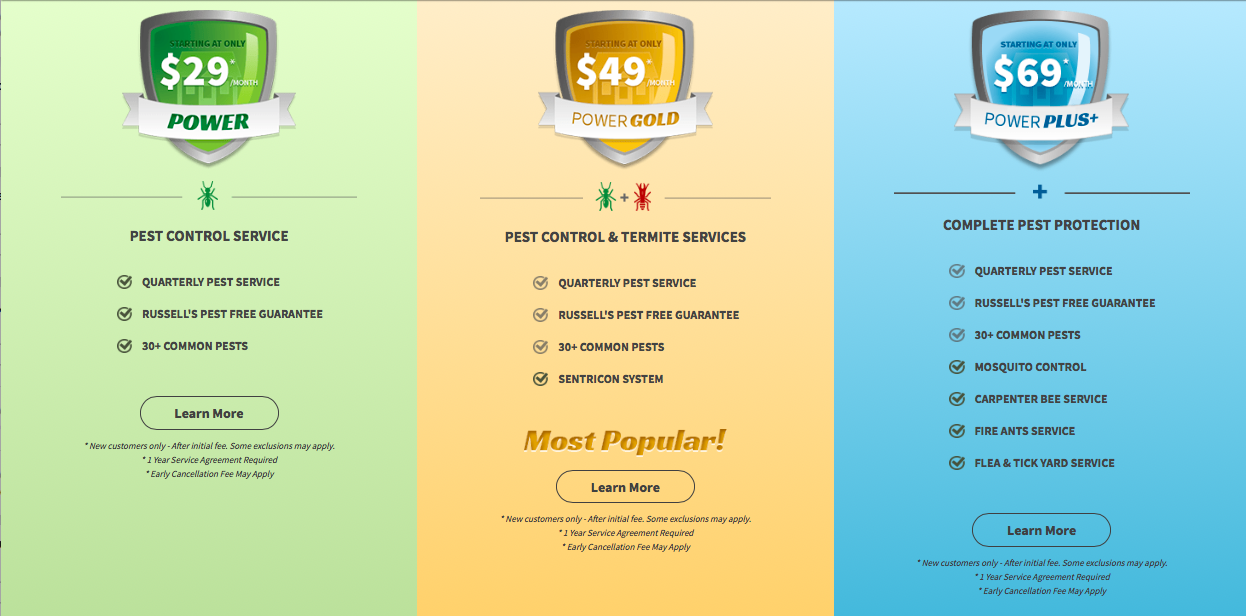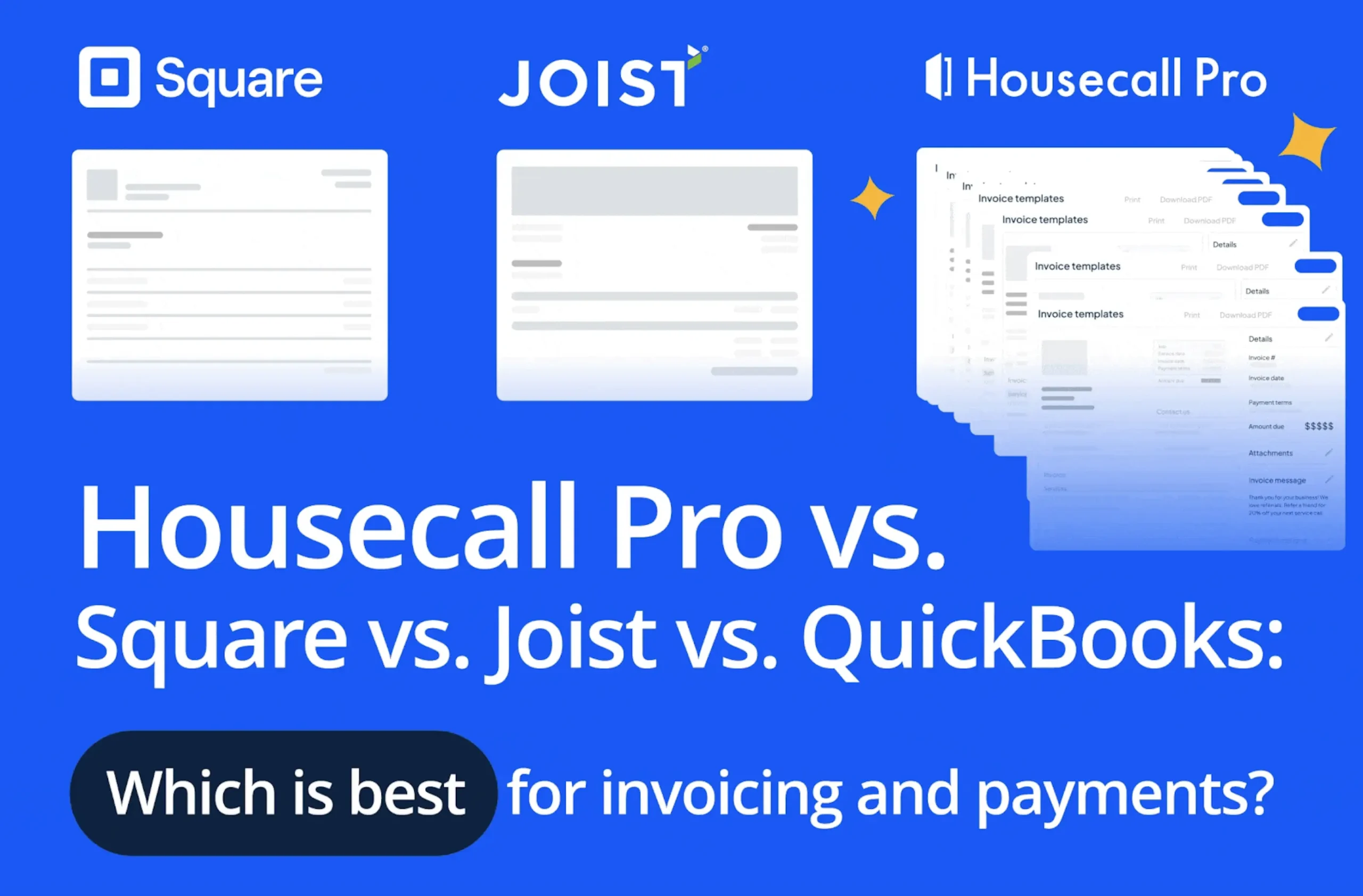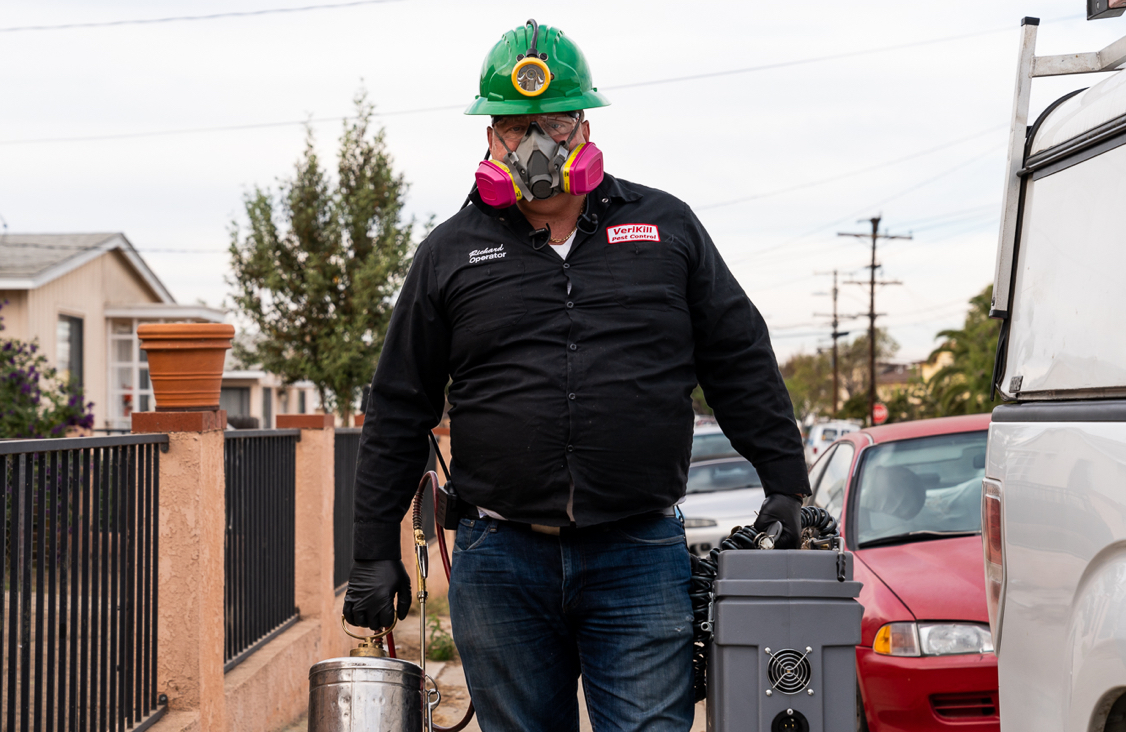
Homeowners are facing more infestation issues, as climate change is spurring the rapid movement and population growth of insects and other pests. This presents a lucrative opportunity for prospective business owners looking to enter the pest control products and services market, which is expected to top $36 billion by 2030.
As a pest control business owner, you’ll be entering a recession-proof market with flexibility, freedom, and high-income potential. But even if you know the trade well, running a business might be new to you.
That’s why we’ve put together a comprehensive guide to help you understand how to start a successful pest control business. We’ll go through all the basics and guide you through the tools that successful exterminator business owners use to streamline their business.
Starting a Pest Control Business Table of Contents
- Is Pest Control a Good Business to Start?
- How Profitable Is a Pest Control Business?
- Steps Needed to Start Your Pest Control Venture
- 1. Do Your Research and Identify Market Demand
- 2. Lay the Legal Groundwork
- 3. Craft Your Business Identity
- 4. Financial Planning and Setup
- 5. Buy Pest Control Equipment and Supplies
- 6. Determine Your Services & Pricing
- 7. Establish Your Client Base
- 8. Invest in Marketing and Client Acquisition
- 9. Focus on Delivering the Best Pest Control Experience
- 10. Scale With Pest Control Management Software
- What To Do Next With Your New Pest Control Company
Is Pest Control a Good Business to Start?
With manageable startup costs, consistent year-round demand, and room for growth, a pest control business can be profitable in just a few years. As your business grows, you can consider expanding to specialized and lucrative niches, such as eco-friendly pest control and wildlife removal services.
Here’s why starting a pest control business could be a smart move:
Benefits of Starting a Pest Control Business
High Demand Year-Round
Rodents and invading bug species are everywhere in urban spaces, requiring regular sanitation. Seasonal changes invite special pest-related problems, such as mosquitoes and ticks in the summer or wasps and termites in the spring.
Low Startup and Operational Costs
Compared to manufacturing or retail, pest control has minimal overhead costs.
Initial costs typically include:
- Transportation
- Protective Equipment
- Licensing and Training
Multiple Revenue Streams
A steady residential, agricultural, and commercial client roster can help you create multiple revenue streams that bring in profits without significant effort. Starting a pest control company can open avenues to:
- Diverse Client Base: Residential, commercial, and agricultural clients can create year round revenue.
- Flexible Pricing Models: Service contracts and tiered pricing structures can maximize profits with low effort.
How Profitable Is a Pest Control Business?
If you’re wondering, “is a pest control business profitable,” let’s go through some facts.
Data from 1,220 franchise enterprises indicates that a pest treatment business can generate an average of up to $400,000 (gross income) on average in a good year. According to Glassdoor, pest treatment businesses can earn profits of up to $104,000 per year.
Solopreneurs may not be able to tackle as many exterminations in a day as businesses with staff do; however, due to lower overhead costs, this may result in roughly the same annual gross revenue on average.
Ultimately, your yearly revenue will depend on various factors such as your pricing, range of services, location, and marketing efforts.
Steps Needed to Start Your Pest Control Venture
When considering what is needed to start a pest control business, you must include everything from licenses and certifications to the right equipment, insurance, and business management tools.
Here is a clear and detailed breakdown of all the steps you need to take to get your pest control venture off the ground.
1. Do Your Research and Identify Market Demand
There are over 33,000 pest control companies in the U.S. You’ll need to make every effort to ensure your business stands out amid this statistic. The best way to do that is to start with market research.
Researching the pest control market in your locality will help you gain insights into the following:
- The range of services your competitors are offering
- Local demand, i.e., what your potential customers need
- Unaddressed pain points, i.e., pest issues that need attention but aren’t being serviced
- Niche or specialized pest control demand
This information will help you gain a better grasp of your local market and understand any glaring gaps your business can fill. For example, if you notice that your locality has few pest control services that tackle termites or rodents, this could be an excellent market to target.
Following research, you can start working on your next step, which is to write a business plan. This entails describing the services you intend to provide and the markets you intend to target. For example, are you looking at residential or commercial pest control services or both? You may also want to consider the types of pests you want to specialize in.
Your business plan should include financial goals, projections, expansion plans, staff recruitment, sales and marketing strategies, and a budget. While these decisions will depend on what you’ve discovered during your market research phase, they will also determine the trajectory of your business.
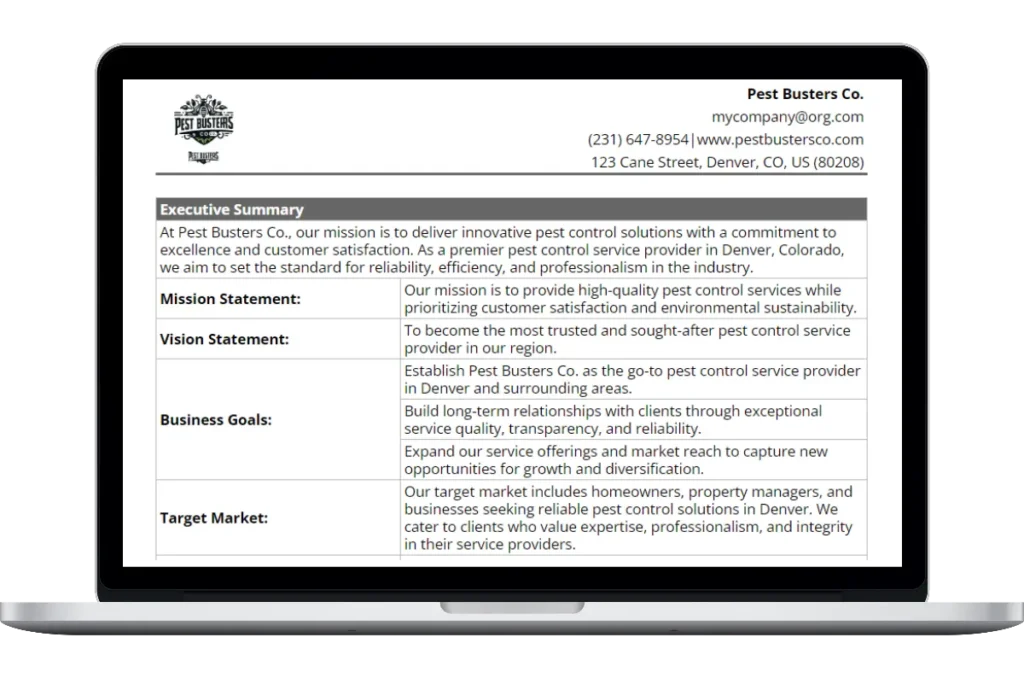
Free template: Grab a copy of our pest control business plan template to ensure you have a solid foundation for planning, starting, and successfully launching your new pest control venture.
2. Lay the Legal Groundwork
This step includes piecing the building blocks of your business, from legal requirements to company registration.
What Licenses Do I Need to Start a Pest Control Business?
Running a compliant pest control company in the U.S. requires serious legal considerations. The exact licensing requirements will vary by state and locality. It’s important to check with your state’s Department of Agriculture and local government for specific licensing requirements in your area. Most states require applicators to be at least 18 years old and pass certification exams to obtain licenses.
Some states may mandate that you have prior pest control experience (1-2 years) with a licensed professional. In general here are the licenses you’ll need:
- Pest Control Operator License: Main license for offering pest control services, covering inspections, treatments, and maintenance. Requires passing an exam.
- Business License: General license issued by local authorities to legally operate to confirm compliance with local laws and taxes.
- Pesticide Applicator Certification: Required for using restricted-use pesticides. This may need separate certifications for various applications (agricultural, structural, etc.).
- Commercial Applicator Business License: Necessary for businesses applying pesticides for hire. Requires proof of insurance.
- Specialized Permits: Needed for specific services like fumigation or wildlife control.
- Local/Municipal Permits: Additional permits may be required based on local regulations.
Learn more: Pest control licensing requirements by state.
Choosing a Legal Business Structure
Choosing a legal business structure should be next on your list. You can register your pest control company as an S or C corporation or a limited liability company (LLC). Each structure comes with distinct liabilities, tax, and documentation requirements. Try to avoid Sole Proprietorship or Partnership as these don’t separate personal and business assets, putting your personal assets at risk if the business faces legal issues.
Insurance Coverage
A pest control job entails handling toxic chemicals daily, putting you and your staff at risk. Insurance is the best safety net against these risks. General liability insurance can protect your business from accidental spills, injuries, or potential damage. You may also want to explore getting a bespoke insurance policy that covers pest control-related risks.
3. Craft Your Business Identity
After laying the legal groundwork for your new pest control venture, begin shaping your business’ identity by choosing a unique and memorable name. You want a name that stands out among your local competitors while revealing a little about your company’s offerings.
Choose a Memorable Business Name
Your business name should communicate what you do. Consider including terms like “exterminator,” “pest control,” or “termite specialist” based on your focus areas. Create a list of 4-5 potential names and check for availability:
- State registration: Verify on your state’s business registration site (e.g., Department of Commerce).
- Trademark search: Use the U.S. Patent and Trademark Office website to ensure no trademark conflicts.
Define Your Unique Value Proposition (UVP)
Your UVP explains what sets your business apart from the competition. It highlights your services’ value and unique aspects. For example, if you offer eco-friendly treatments or emergency pest control services, make sure this is clearly communicated in your UVP.
Focus on Business Branding
Your business name and UVP should be reflected in your branding, including logos, marketing materials, and online presence. Secure your business name on social media channels and domain registration sites like GoDaddy or Name.com.
Consider working with a professional designer to create a logo that conveys your business’s values and credibility. This is a key investment in building a strong, recognizable brand.
4. Financial Planning and Setup

You’ll need financing to get your pest control business off the ground. Calculate your startup costs before you begin securing funding. You can do this by breaking down the costs of key operations, including equipment, licenses, certifications, registration, and hiring.
You’re off to a good start if you have adequate capital to support these costs. If not, you might need a loan or line of credit. Try to secure traditional financing from your bank. If you don’t qualify for a loan, you can consider alternative lenders, including:
- Small Business Administration (SBA)
- Home equity line of credit, or HELOC, which offers loans at competitive rates
- Minority Business Development Agency (MBDA)
Advice for Aspiring Pest Control Entrepreneurs
Jake Goodwin, owner of Bug Masters of San Jose, CA, talked to The Pest Posse about how he got started. Jake got a loan from the Small Business Administration for some of his startup costs and warns others that it takes at least a couple of months to work through the loan process.
“Also the operator process to get your operator’s license is simple but also takes time … and it takes multiple applications to get your operator’s license, not just one. So anybody out there that is interested in doing this, do not just quit your job and say we’ll have a company up and running in 30 days. It’s not going to quite work like that.”
Before securing a loan, open a dedicated bank account for your pest control company. This will help you manage expenses, calculate your profit margin, and help you access loans, credit lines, and other financing options more conveniently. It will also make filing taxes easier and keep your books balanced and separate from your personal assets.
How Much Does It Cost to Start a Pest Control Business?
Pest control startup costs roughly range between $10,000-$20,000 but can reach up to $50,000, depending on the size and location of your business. It’s a good idea to draw up a rough cost estimate so you can identify areas to cut costs.
While making a list of costs, ensure you include these elements:
- Licensing and certifications can cost $75 to $300.
- Equipment needed for the pest control business, including sprayers, foggers, pesticides, traps, foamers, and other office supplies, can cost between $200 to $2,000.
- Marketing may cost between $200 to $1200. Expect to allocate between 2-15% of your annual revenue for marketing.
- Insurance can cost between $500 to $735 annually, depending on your policy.
- Pest control technician salaries are around $44,000 annually.
- Miscellaneous overheads, such as tools, first aid kits, company transportation, and labor costs, can cost at least $2,000.
5. Buy Pest Control Equipment and Supplies
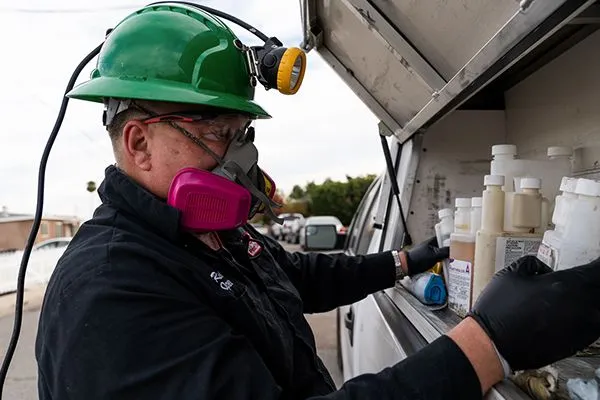
Pest control supplies and equipment are integral to your business but may vary depending on your services.
What Equipment Do I Need to Start a Pest Control Business?
Start with essential, versatile equipment to manage common pest issues. As your business grows and you determine your specialties, expand your inventory gradually to avoid unnecessary expenses. Here’s a list of tools to invest in:
- Work Vehicle
- Toolkit & LED Flashlight
- Backpack Sprayers & Inspection Cameras
- ULV Cold Fogger & Thermal Fogger
- Dusters for Insecticidal Dust
- Bait Guns & Nets/Screens (for flying insects)
- Ladders & Telescopic Poles
- Chemical Injection Devices
- Insect Light Traps
- Rodent Bait Stations/Traps
- PPE Kit (masks, gloves, coveralls)
- First-Aid Kit
Pest Control Chemicals
The specific chemicals you use will depend on your company’s needs and services. States allow the sale and use of pesticides in compliance with the Federal Insecticide, Fungicide, and Rodenticide Act, or FIFRA. Research your local and state requirements before purchasing chemicals for your business.
To avoid toxic chemicals, look into chemical-free or eco-friendly options that appeal to evolved consumers. These options are popular among homeowners with families and pets and commercial offices that value sustainability. If marketed well, this niche offering can help your business flourish among eco-conscious customers.
6. Determine Your Services & Pricing
Source: Russel’s Pest Control
Defining your service offerings is essential for a successful pest control business. Use market research to identify high-demand pest issues in your area. For instance, if wildlife pests are common year-round locally, include these in your core services.
Core and Specialized Services
- Core Services: Address the most common pest problems in your region.
- Niche Expertise: Offer specialized services for unique problems, such as bed bug infestations, which have increased due to international travel—positioning your company as a trusted solution for homeowners, hotels, and property managers.
Strategic Pricing
You can also structure your pricing in a tiered manner to cater to a diverse clientele with different budgets and needs. For example, you can package your services as Basic, Standard, and Superior, each featuring distinct services, follow-ups, and warranty periods. When pricing services, be strategic:
- Pricing Strategies: Use flat rate, value-based and tiered pricing to cover materials, labor, and overhead.
- Profit Margin: Factor in at least a 15% profit margin over your hourly rate.
- Competitor Analysis: Use competitor rates as a reference but consider your specific overheads and expertise for accurate pricing.
Make sure your prices are high enough to maintain your profit margin on large properties or properties at the far edges of your coverage area or build in surcharges for jobs out-of-the-ordinary. For instance, according to pestcontrolreviews.com, some pest control professionals charge an extra $25 for every 1,000 square feet over 1,500.
Learn more: Easily present competitive pricing, streamline cost estimations, and improve budget accuracy by grabbing a copy of Housecall Pro’s pest control quote template.
7. Establish Your Client Base
Your pest control company can earn more revenue with repeat customers, so focus on building a long-term relationship with your clients. You can tap into commercial, residential, and agricultural markets. Start acquiring clients within your neighborhood initially, expanding further afield as you scale.
You must also consider what most of your clients are looking for (speedy service/specific pest issues/budget contracts) and market your services accordingly to build a loyal customer base. For example, you could package your services into a yearly contract and offer customers a 15% discount.
Or, you can offer seasonal treatments at a lower price if customers sign up for the package a year in advance. Incentives like these can lead to longer service contracts and recurring renewals, ensuring steady revenue year after year.
Get In Touch: 858-842-5746
Let us earn your trust
On average, Pros increase monthly revenue generated through Housecall Pro by 50% after their first year.
See plan options and feature breakdown on our pricing page.
8. Invest in Marketing and Client Acquisition
Creating a strategic online presence is crucial for any business seeking a loyal client base. Since people routinely search for pest control services on Google, you’ll need to ensure yours is up there, too. The best way to do this is to create or claim your Google Business Profile, which is a lead magnet for local customers. When people can find a tangible virtual version of your business, it boosts credibility.
- Create a High Converting Website: Showcase your services, and pricing, have CTA’s throughout every page along with special offers. Make sure it’s mobile-friendly, loads fast, and is optimized for search with local keywords strategically placed in metadata, headings, and page content.
- Optimize for Local Search: Claim and optimize your Google Business Profile to appear in local searches and attract more customers. Encourage past, current and future clients to leave reviews to improve your conversions.
- Social Media: Leverage platforms like Facebook, Instagram, and LinkedIn to showcase your pest control services. Keep your profiles updated with contact details, service information, and customer testimonials. Post engaging content, like tips and before-and-after photos, which can also boost your visibility.
- Invest in Paid Marketing: Invest in paid marketing like Google Local Service Ads and Facebook Ads to reach local homeowners and property managers without overspending.
- Leverage Networking and Referrals: Attend local events to connect with businesses and homeowners’ associations. Partner with property managers and real estate agents for potential referrals and offer incentives, such as a 10% discount for successful leads.
- Traditional Marketing: Send postcards, flyers, or brochures to local neighborhoods, highlighting special offers or seasonal discounts to attract new customers.
Learn more: Hire the website experts at Housecall to enjoy a custom, SEO-friendly pest control website fully integrated with powerful features like online booking, customer chat, and reviews automatically published.
Free Ways to Advertise Your Pest Control Business
While digital marketing is essential, traditional marketing methods like word-of-mouth marketing remain one of the most trusted ways to grow your pest control business. On a follow-up episode of The Pest Posse, Jake told XX that most of his initial customers came from “friends, networking, and referrals.” He wisely explained that he didn’t want to spend money he wasn’t yet making. Here’s what we recommend to start when you’re trying to bootstrap with little capital:
1. Chamber of Commerce: It’s a business network like a local organization of businesses. We highly encourage you to network with other small business owners. Many pest control professionals received work by engaging with other service professionals in their area
2. Facebook Groups: You can network and join Facebook Groups, engage and add value to the groups, and offer promotional discounts for group members.
Make each customer count by asking them to leave a review and/or refer your services. Per one study, 70% of customers would leave a review if asked.
9. Focus on Delivering the Best Pest Control Experience
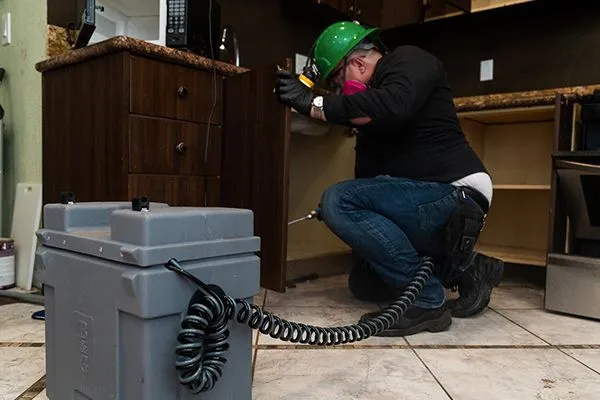
Marketing strategies will make your business more visible, but only satisfied customers will endorse your business. As a new pest control business, you want to tick all the boxes field service businesses are known for speed, communication, professionalism, and most importantly, excellent service and results.
It’s important to hold your team to a high professional standard, whether by training them in client service or assigning them neat and clean uniforms. Clamp down on mistakes that could lead to poor client experiences, such as overbooking or service delays.
Use automated tools to better manage team schedules and response times. Remember, your pest control service does not end when your team completes the extermination. It is a continual process that includes providing helpful follow-ups after each service, reaching out to clients with relevant service plans, and sharing useful pest control practices long after the service to show you care.
10. Scale With Pest Control Management Software
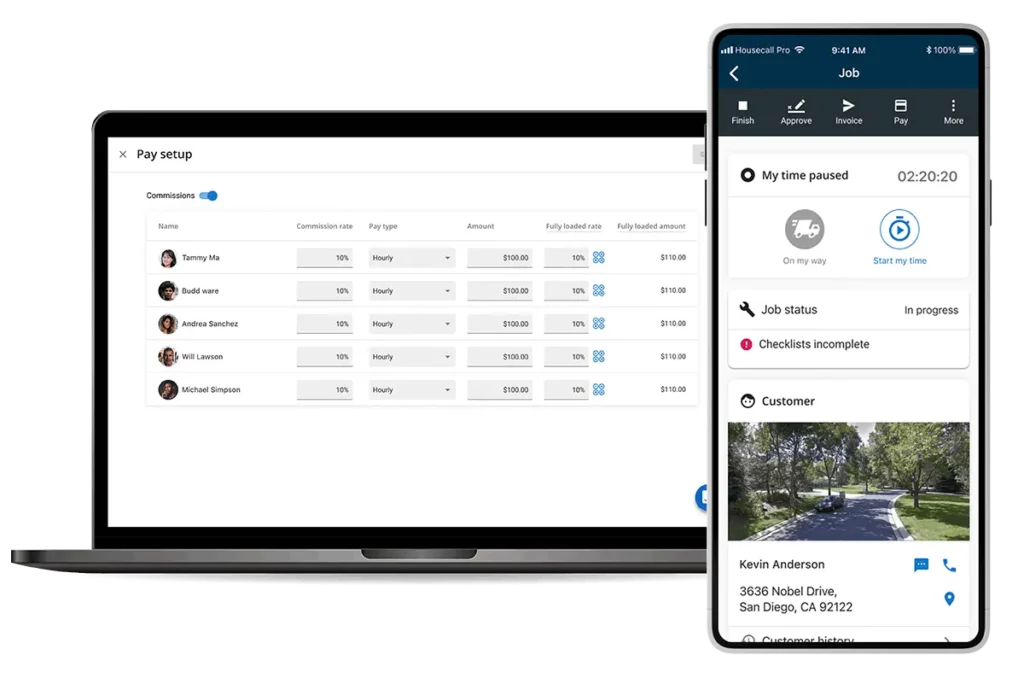
Your growing business can benefit from smart pest control business management software that helps you improve various aspects of your daily operations. The software’s automated features ensure staff efficiency and ensure excellent communication with your customers. Here are some features to look for when choosing pest control business software:
- Scheduling and Online Booking: Look for software that simplifies the process of booking online appointments and scheduling them to ensure timely and hassle-free service
- Dispatching and GPS Tracking: The best kinds of software offer live GPS tracking and efficient dispatching tools complete with route planning to help improve response times.
- Pest Control CRM: A customer relationship management (CRM) system can help you track key client conversations and view their past services and inquiries. You can gear your services to customer needs with these rich insights, increasing client retention.
- Invoicing and Payments: A reliable invoicing and automated billing system can send, track, and process invoices and payments swiftly, ensuring steady revenue
- Reviews: Look for software that streamlines customer reviews, allowing you to manage feedback easily.
- Mobile App: Your pest control business needs a nifty mobile app that allows your technicians to access service requests, communicate delays, and pull up service records on the go.
What To Do Next With Your New Pest Control Company
As your pest control business grows, managing daily operations can become more complex and time-consuming. Even if you know the industry well, it can take a few years to establish your company, develop best practices, build a reputation, and gain a consistent customer base. Just keep at it, and you can create a successful business that returns six figures. If you’re thinking of starting a pest control business or have already begun, sign up for a free 14-day demo with Housecall Pro today and see how our software can set you on the path to long-term success.
Pest Control Business FAQ
-
How much do pest control business owners make annually?
-
Although pest treatment business revenue varies according to size, location, services, and marketing level, most pest control businesses earn $50,000 to $100,000 or more on average. On the higher end, larger pest treatment companies and franchisees can earn up to $400,000 on average.
